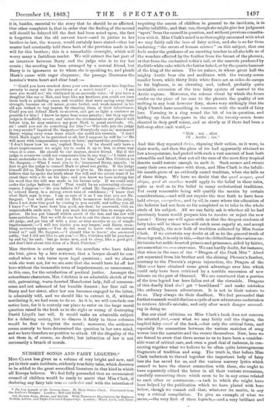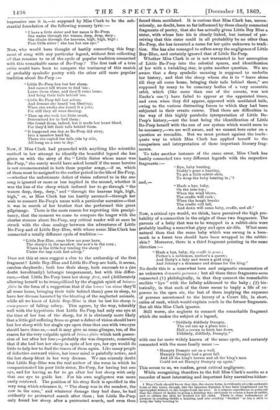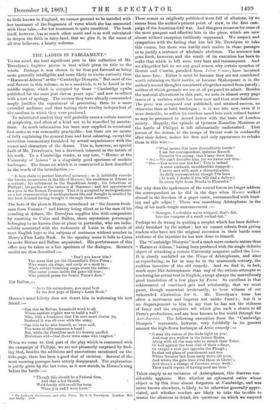NURSERY SONGS AND FAIRY LEGENDS.*
Miss CLARK has given us a volume of very bright and new, and yet in their main incidents, evidently true fairy tales, which deserves to be added to the great accredited literature in that kind in which all Europe believes. We feel fully persuaded that an oecumenical council of children would be ready to assert that Miss Clark, if declaring any fairy tale true ex cathedra and with the intention of * 27te Lost Legendr of the Nursery Songs. By Mary Senior Clark. Illustrated from the Author's Designs. London: Bell and Daldy.
Old Nursery Songs, Stories, and Ballads. With Numerous Illustrations by Eminent Modern Artists, and Eight Coloured Engravings. London : Ward, Lock, and Tyler. requiring the assent of children in general to its incidents, is in reality infallible, and that, too, though she might give her judgment "apart" from the council in question, and without previous consulta- tion with it. Miss Clark's mind is so thoroughly saturated with what we may fairly call the laws of fairy action, and she is so far from endorsing "the errors of human science" on this subject, that one feels under the guidance of an unerring teacher in all she tells us of the wonders effected by the feather from the breast of the phoenix, or that from the enchanted robin's tail, or the marvels produced by the little white cake which the fairies baked, or by the quartz hammer of the king of the mines. The ice palace, in whose great hall the mighty Arctic bear site and meditates with the twenty-seven smaller bears, while thirty little white foxes act as aides-de-camps to his highness, is an elevating and, indeed, probably quite inevitable extension of the true fairy system of marvel to the Arctic regions. Moreover, the solemn ritual by which the bears confer on the piece of ice sent to the phoenix the quality of not melting in any heat however fiery, shows very strikingly that the High Church have something in common with the world of fairy lore. Forming in a ring round the bit of ice in question, and holding up their fore-paws in the air, the twenty-seven bears chanted in deep gruff voices, and as slowly as if there had been a full-stop after each word,—
"Melt . not . slice Of . Arctic . ice."
And this they repeated thrice, rhyming their action, as it were, to their words, and then the piece of ice had apparently attained so low a temperature, had parted with such a vast amount of heat both ostensible and latent, that not all the suns of the most fiery tropical deserts could restore enough to melt it. Such scenes and events carry their own evidence with them, and Miss Clark is the infalli- ble mouth-piece of an evidently sound tradition, when she tells us of these things. We have no doubt that the quad semper, quad ubique, quad ab omnibus would apply to the belief in these tales, quite as well as to the belief in many ecclesiastical traditions. Yet every reasonable being will qualify the maxim by certain considerations,—and will not require the true faith to have been held always, everywhere, and by all, in cases where the education of the believer had not been so far completed as to take in the whole circle of his subject. All we can fairly ask is whether all he had previously learnt would prepare him to receive or reject the new lesson ? Every one will agree with us that the deepest students of fairy tales will be those who will catch most eagerly at, and accept most willingly, the new bulk of tradition collected by Miss Senior Clark. if we entertain any doubt at all as to the general truth of these legends, it is only in this,—that the difficultiesof the various un- fortunate but noble-hearted princes and princesses, aided by fairies, are somewhat too soon overcome. We can hardly doubt, for instance, that when in the cave of the "Dragon of the Dark Mist" Aired got separated from his brother. and the shining Phoenix's feather, contrary to the Phoenix's express injunction, the Dragon of the Mist 'oust have obtained some great advantage over him which could only have been retrieved by a terrible succession of new labours on the part of Osmuud. We are convinced that a portion of the true legend has here fallen out of the chronicle. Dragons of this deadly kind don't get " bewildered" and make mistakes like ordinary human adventurers. It is not in their nature to do so. They always do their deadliest. We feel persuaded that further research would disclose a cycle of new adventures undertaken to retrieve Alred's mistake, and only after much danger succeed- ing in doing so.
But our chief criticism on Miss Clark's book does not concern the attested fact,—nor what we may fairly call the dogma, the implied fairy creed of the book,—but only the critical form, and especially the connection between the various snatches of song woven into the narrative and the events themselves. Now, here we are forced to avow that there seems to us to have been a consider- able want of critical care, and even a good deal of rashness, in con- necting together what we believe to be often quite heterogeneous fragments of tradition and song. The truth is, that before Miss Clark undertook to thread together the important body of fairy lore she has saved for us, and the various nursery lyrics which seemed to have the closest connection with them, she ought to have separately edited the latter in all their various recensions, carefully connecting those which seem to be in any sense related to each other or continuous,--a task in which she might have been helped by the publication which we have placed with hers below, though we cannot call that, whatever its merits, in any way a critical compilation. To give an example of what we mean,—the very first of these legends,—and a very brilliant and
impressive one it is,—is supposed by Miss Clark to be the sub- stantial foundation of the following nursery lyric:—
"I
have a little sister and her name is Bo-Peep, She wades through the waters, deep, deep, deep ; She climbs through the heavens, high, high, high ; Poor little sister ! she has but one eye."
Now, who would have thought of hastily connecting this frag- ment of song with any particular legend, without first collecting all that remains to us of the cycle of popular tradition connected
with this remarkable name of Bo-Peep ? The first task of a true critic would have been to compare the testimony of this snatch of probably symbolic poetry with the other still more popular tradition about Bo-Peep :—
" Little Bo-Peep has lost her sheep, And cannot tell where to find 'em ; Leave them alone, and they'll come home, And bring their tails behind 'em.
"Little Bo-Peep fell fast asleep, And dreamt she heard 'em bleating; When she awoke she found it a joke.
For still they all were fleeting.
"Then up she took her little crook, Determined for to find them : She found them, indeed, but it made her heart bleed, For they'd left their tails behind them.
"It happened one day, as Bo-Peep did stray, Into a meadow hard by, There she espied the tails side by side, All hung on a tree to dry."
Now, if Miss Clark had proceeded with anything like scientific method in her attempt to identify the beautiful legend she has
given us with the story of the " Little Sister whose name was Bo-Peep," she surely would have asked herself if the same heroine is not commemorated in both these popular songs,—if so, which of them must be assigned to the earlier period in the life of Bo-Peep, —whether the unfortunate defect of vision referred to in the one song is ignored or more or less implied in the second, whether it was the loss of the sheep which induced her to go through " the waters deep, deep, deep," and " through the heavens high, high, high," or, as Miss Clark has too hastily assumed—through her wish to connect Bo-Peep's name with a particular narrative—that it was in search of her brother that she performed this great pilgrimage. There is the more reason for regretting this precipi- tancy, that the moment we come to compare the longer with the shorter stanzas about Bo-Peep, any critical reader will at once be struck with the close analogy between the adventures of Little Bo-Peep and of Little Boy-Blue, with whose name Miss Clark has connected a totally different cycle of tradition :-
"Little Boy-Blue, come blow me your horn, The sheep's in the meadow, the cow's in the corn ; Where is the little boy tending the sheep ? Under the hay-cock fast asleep."
Does not this at once suggest a clue to the authorship of the first fragment? Little Boy-Blue and Little Bo-Peep are both, it seems, careless shepherds ; both lose their sheep, both succumb to a (no
doubt hereditarily) lethargic temperament, but with this differ- ence,—that Little Bo-Peep loses her sheep first, and (deliberately allowing herself to be tranquillized by the sluggish spirit of laissez- faire in the form of a suggestion that if she leaves 'em alone they'll all come home, bringing their tails behind them) goes to sleep, to have her dreams haunted by the bleating of the neglected animals, while all we know of Little Boy-Blue is that he lost his sheep in consequence of falling asleep. This agrees, by the way, tolerably well with the hypothesis that Little Bo-Peep had only one eye at the time of her loss of the sheep, for it is obviously more likely that a little girl suffering from so great a defect of vision should have lost her sheep with her single eye open than that one with two eyes should have done so,—and it may give us some glimpse, too, of the reason for the very culpable spirit of laissez-faire which took posses- sion of her after her loss ;—probably she was desperate, reasoning
that if she had lost her sheep in spite of her eye, her eye would do little to help her to find the traces of them again. Like many people of defective outward vision, her inner mind is painfully active, and the lost sheep bleat in her very dreams. We can scarcely doubt that Little Boy-Blue was the real author of the verse in which he compassionated his poor little sister, Bo-Peep, for having but one eye, and for having so far to go after her lost sheep with only
that one eye to guide her. For his own negligence was more easily retrieved. The position of his stray flock is specified in the
very song which rehearses it, " The sheep was in the meadow, the cow in the corn," and whatever damage they had done, he had evidently no protracted search after them ; but Little Bo-Peep
only found her sheep after a protracted search, and even then
found them mutilated. It is curious that Miss Clark has, uncon- sciously, no doubt, been so far influenced by these closely connected fragments of poetry, that she has actually given Little Boy Blue a sister, with whose fate his is closely linked, but instead of per- ceiving that this sister could in all probability be no other than Bo-Peep, she has invented a name for her quite unknown to tradi- tion. She has also managed to soften away the negligence of Little Boy-Blue, and certainly ignored that of Little Bo-Peep.
Whether Miss Clark is or is not warranted in her assumption of Little Bo-Peep into the celestial spaces, and identification of her with a twinkling star, is quite another question. We are aware that a deep symbolic meaning is supposed to underlie her history, and that the sheep whom she is to " leave alone till they all come home, bringing their tails behind them," are supposed by many to be cometary bodies of a very eccentric orbit, which (like more than one of the comets, was not Eucke's one ?) have failed to appear at the appointed times, and even when they did appear, appeared with mutilated tails, owing to the various distracting forces to which they had been subjected in their erratic course. That there are difficulties in the way of this highly parabolic interpretation of Little Bo- Peep's history,—not the least being the identification of Little Bo-Peep herself with the sun of our system which would seem to be necessary,—we are well aware, and we cannot here enter on a question so recondite. But we must protest against the inade- quate way in which Miss Clark has applied herself to the comparison and interpretation of these important literary frag- ments.
To take another instance of the same error, Miss Clark has hastily connected two very different legends with the respective
fragments :— "Bye, baby bunting,
Daddy's gone a hunting, To get a little rabbit-skin, To wrap the baby bunting in ;"t "Hush a bye, baby, On the tree-top; When the wind blows, The cradle will rock ; When the bough breaks The cradle will fall, And down will come baby, cradle, and all."
Now, a critical eye would, we think, have perceived the high pro- bability of a connection in the origin of these two fragments. The parents of a baby that was to be wrapped in a rabbit-skin were probably leading a somewhat gipsy and open air-life. What more natural than that the same baby which was swung in a ham- mock to a forest tree should have been wrapped in the rabbit- skin ? Moreover, there is a third fragment pointing in the same direction :—
" Hush a bye, baby, thy cradle is green ;
Father's a nobleman, mother's a queen ; And Betty's a lady and wears a gold ring ; And Johnny's a drummer and drums for the king."
No doubt this is a somewhat bare and enigmatic enumeration of an unknown dramatis personx ; but all these three fragments seem connected (1) philologically, in that they connect the remarkable enclitic " bye " with the lullaby addressed to the baby ; (2) his- torically, in that each of the three seems to imply a life of ex- posure in the open air, the last of them implying the exposure of persons accustomed to the luxury of a Court life, in short, exiles of rank, which would explain much in the former fragments. But all this Miss Clark ignores.
Still worse, she neglects to connect the remarkable fragment which she makes the subject of a legend,
"Diddledy diddledy Dumpty, The cat ran up a plum tree ; Half-a-crown to fetch her down, Diddledy, diddledy, Dumpty,"
with one far more widely known of the same cycle, and certainly connected with the same family name :—
" Humpty Dumpty sat on a wall, Humpty Dumpty had a great fall,
And all the king's horses and all the king's men Could not set Humpty Dumpty up again."
This seems to us, we confess, great critical negligence.
While recognizing therefore to the full Miss Clark's merits as a recorder of most interesting and important fairy narratives hither-
t Miss Clark should know that this, the shorter form, is evidently also the authentic form of this verse, though, like the Ignatlan Epistles, it has been lengthened out by apocryphal writers to the longer form she uses. It is almost superfluous to point out that the object of daddy in going a hunting was obviously to course a hare or rabbit, and so obtain the skin he wanted for his child. There is clear redundancy of purpose in sending daddy a hunting, and also sending "brother" to buy a skin to wrap the baby bunting in.
and,— to little known in England, we cannot pretend to be satisfied with her treatment of the fragments of verse which she has connected with these tales,—for her treatment is quite uncritical. The book itself, however, has so much other merit and is so well calculated to deepen the faith in fairy-land, that we give it, in the name of all true believers, a hearty welcome.








































 Previous page
Previous page